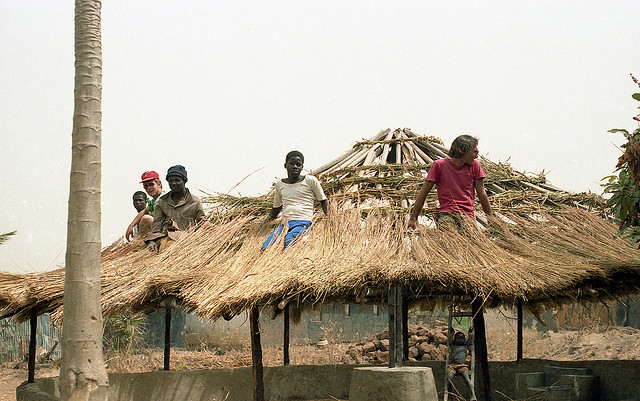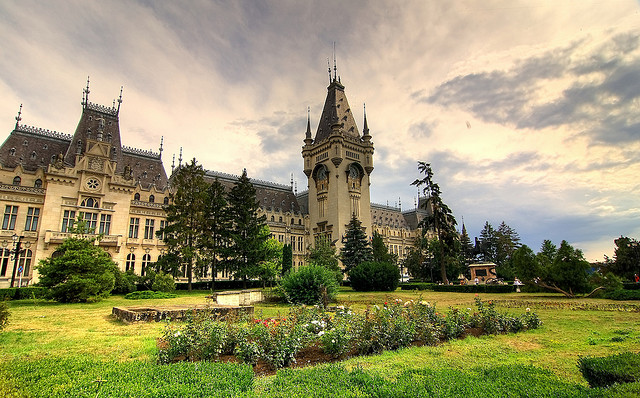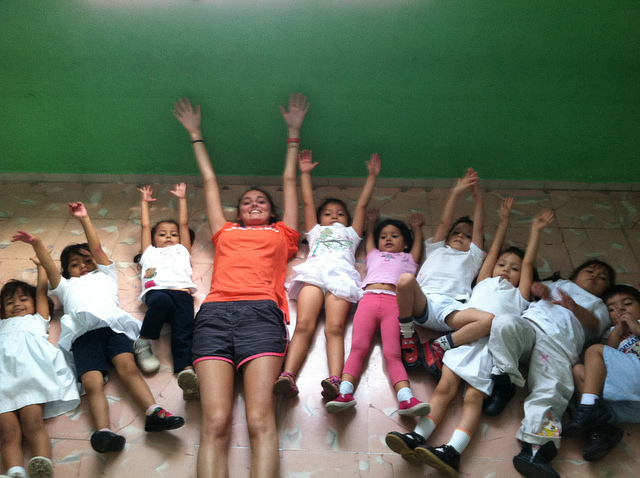More than 1.6 million people volunteer internationally every year. With so many helping hands, humanitarian work is progressing all around the world. However, being unprepared for the culture shock can ruin what could be an inspiring experience. Stowaway researched suggestions for those who aspire to volunteer abroad. I interviewed three of these 1.6 million selfless workers. Each shared both joys and sorrows. Here are their stories and advice regarding international volunteerism.
ABBY CHRISTIANSEN
Abby volunteered to teach English in China with her husband during the winter of 2013. Then, over summer 2014, Abby spent a month in Africa as part of an internship to learn more about how nonprofit organizations work in Uganda and its surrounding countries.

Ugandan men take a break while constructing a hut. Volunteers frequently help with building huts like this one, unwittingly wasting time and resources because volunteers don’t have the necessary construction skills. Photo by Paul–W. cc
Ugandan men take a break while constructing a hut. Volunteers frequently help with building huts like this one, unwittingly wasting time and resources because volunteers don’t have the necessary construction skills.
Invest in something longterm. You can make the biggest difference if you invest in something longterm. Most volunteer trips only last a week or two, and that’s okay. Any help given is always needed. But if you can stay longer, do so. Staying longer—at least a month—gives you a different perspective. “It gives you a better feel for the people and gives you more cultural context,” Abby said. Your extended stay also allows you to see more progress. By understanding the needs of the culture, you can identify ways to make the volunteer efforts more efficient. Investing for longer is more efficient for the organization as well, because less time is lost by constantly training new recruits. If you can’t stay for very long, then you can spend your time more wisely by investing in something that will be meaningful to the people in the long run. At one point, Abby helped build mud huts in a village outside Kampala. The idea was nice, but the Ugandans didn’t need help with that—they were far more experienced at construction than the volunteers were. “It was frustrating because I didn’t feel like I was making a difference,” Abby explained. Instead, she recommends teaching English. It’s a skill that will last a long time and will help the students get a better education and a better job.
Choose your program carefully. It’s cheaper and safer to go with an organization than it is to go on your own, but choose wisely who you go with. Carefully research the organization. Specifically, look for how much of their money is spent on their own expenses and how much money actually gets to the people. Abby recommends going with local companies rather than international organizations. Local ones understand the needs of the people better and usually cost less.
OLIVIA BERGEN
Olivia worked in Romania for the summer of 2014. She taught English in an elementary school, volunteered at an orphanage for disabled children, and helped in a children’s hospital. About her experience, she said, “It gave me a totally different view of the world and how I want to live in that world, and I wanted to have an impact that I think is meaningful.”

An old castle in the city of Iasi is part of the beautiful scenery of rural Romania. Naturally, visiting sites is part of the international experience! Photo by Gaspar Serrano. cc
Research what you will be doing. Olivia knew that working in a special-needs orphanage would bring unique challenges. However, there were some of the children that had conditions that she wasn’t prepared to deal with. Olivia said she really wishes that she “would have learned more about the disabilities of the kids in the orphanage. Sometimes they have abandonment issues, medical problems, or other severe maladies.” She would have researched more about these disabilities so that she was “more prepared to understand the kids.”
Don’t judge the culture. In Romania, tourists are warned of a stigma against gypsies. They have a reputation for being thieves and criminals. However, Olivia found that the more she reacted to that, the more she made herself a target. Keeping her distance, clutching her purse, and other signs of fear marked her as a foreigner and invited catcalls and pickpocketing. But by acting like the people around her, Olivia saw the gypsies in a different light. They are people with families, interests, and personalities. By letting go of the prejudices of the culture, not only was she safer from assault, but she was also more open to new people.
Choose how to spend your energy. Volunteering is a delicate experience. It can be emotionally draining because you are always giving and get little thanks back. Long days of effort sometimes don’t seem to make a difference. To combat discouragement, Olivia suggests prioritizing. “Choose what you’re going to work on, identify what you’re worrying about, and organize your energy accordingly,” she advised.
SARAH PUSEY
In 2013, Sarah spent a semester teaching English in Mexico. She lived with a host family while she was there. During the mornings, she taught children at an elementary school, and then she was free in the afternoons to experience the culture. This trip was especially meaningful to her because it solidified her resolve to become a Spanish teacher.

Volunteering isn’t all work. There is plenty of play, because volunteering is all about building relationships! Sarah loved spending time with the kids outside of school. Photo courtesy of Volunteer Abroad UBELONG. cc
Go with a tour guide. Tour guides know all sorts of handy facts. They know good places to eat, they know which neighborhoods are safe and which ones are not, and they know about cultural gems that don’t appear in travel pamphlets. During their free time, Sarah and other volunteers sometimes traveled with a guide, especially when they were going somewhere unfamiliar. “The tour guide helped make the experience better, and it’s safer to go with one,” she suggested.
Find things in common with the people. Sarah could have focused on the differences between her culture and Mexican culture, but she had a better time building relationships when she found common ground. Sarah found that both she and her host mom loved ice cream, so they would go out for ice cream once a week. Family was also important in both cultures: Sarah is close with her immediate family and extended relatives, and her host family held similar values. The host grandma came over for lunch every day. Everyone went to church together on Sundays. These similarities built friendships and enriched Sarah’s experience. By noting the similarities between teaching children there and children in the United States, Sarah also became a more experienced teacher, better equipped to work with culturally diverse students. “Embrace the culture!” she said.
BECOMING A VOLUNTEER
Wherever you are and however you help, we thank all volunteers! We know it’s hard work, and it can be overwhelming if you’re not prepared. The advice in this article is from volunteers who have already worked abroad. If you’re thinking about helping in a foreign country, these tips can prepare you to have the best time possible.
- blog.movingworlds.org/9-facts-about-international-volunteering
—Hannah Chudleigh
